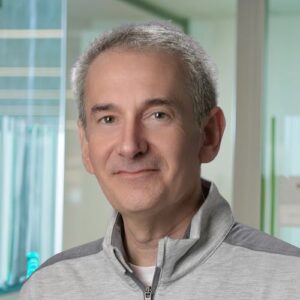
How does a fascination with medicine and the human brain evolve into a career? For Ken Kramer, Vice President and Head of Medical Affairs, Neuropsychiatry Therapeutic Area at BMS, it comes down to one word: commitment. Ever since college, Ken has viewed the human brain as distinctly individualized, “the essence of what a person is and who they are.” This viewpoint drew him to work in neuroscience and psychiatry, and to a career in medical affairs—one that has spanned decades and taken him to some of the most prominent and respected global pharmaceutical companies.
Having recently welcomed Karuna Therapeutics into our organization, we are fortunate to have Ken join us here at BMS. Ken shares his insights into the field of psychiatry, his extensive work in medical affairs, the expertise of his team at BMS in developing innovative treatments for people living with schizophrenia, and how BMS has welcomed him with open arms.
A Career that Bridges Commitment with Compassion
For Ken, psychiatry is “the only therapeutic area I’ve ever worked in and ever wanted to work in.” Such dedication has shaped Ken’s focus on treating schizophrenia, which he describes as “an insidious illness of the brain and the mind. It affects the person living with it—affects their ability to think, thrive, and interact with their surroundings and their loved ones. It is a disease of perception and thought.”
When discussing treatment options for patients with unmet psychiatric needs, Ken stated that psychiatry and neuroscience are “often the forgotten child when it comes to biopharma or pharma in general, because the study of psychiatry is very difficult.” Such unmet need motivates Ken and his team to pursue innovative therapeutics in neuroscience. “When you look at how psychiatric illness is diagnosed and treated,” said Ken, “you realize that we are dealing with a totally subjective therapeutic area. In psychiatric illnesses like schizophrenia, bipolar disorder and depression, there are no X-rays or CAT scans that will confirm a diagnosis or inform you of how well a treatment is working. There are no blood tests that can tell you if a patient is sick, getting better or declining. It’s all based on what you see and what you hear from your patient.”
BMS Is Answering the Call for New Treatments in Neuroscience
These very challenges are why, in Ken’s estimation, many companies left psychiatry as a therapeutic area over the past 20 years or are not willing to take the risks involved in developing new treatments for psychiatric disorders, but the challenges are also why Ken was happy to join BMS. Knowing that BMS has demonstrated a past commitment to psychiatry, and “to those living with severe mental illness,” is deeply motivating for him. So, too, is BMS’ dedication to return to the investigation of new therapeutic options for people with major psychiatric illnesses.
Ken shared that he and his team have been given the resources they need—whether in headcount, funding for research, or the opportunity to attend medical congresses. “I can tell you personally, in my first interactions with BMS’ leadership, I heard the same question over and over again: ‘How can we help you succeed?’ In my experience, that’s not something you hear often,” said Ken.
Why BMS Offers Job Candidates the Chance to Change Lives
For job candidates with a focus on neuroscience and psychiatry, Ken believes BMS provides ample opportunity to grow and give back—and to do so with the support of an entire organization in lockstep. “There’s this understanding that we all have to speak from the same chapter, in verse.” He goes on to note that “what I’ve noticed is a true commitment to cross-functional working.”
Ken believes that BMS’ commitment to innovative treatments is a stand out for candidates who want to help people living with major psychiatric illnesses. He goes on to note that “those living with schizophrenia, their caregivers, their families and their loved ones have a real need for the work that BMS is doing to potentially improve their lives.” It is this very commitment to purpose that helps to fuel Ken’s passion, one that is shared across the organization. “Together,” said Ken, “we are able to bring new, innovative medication to patients who need it most.”





